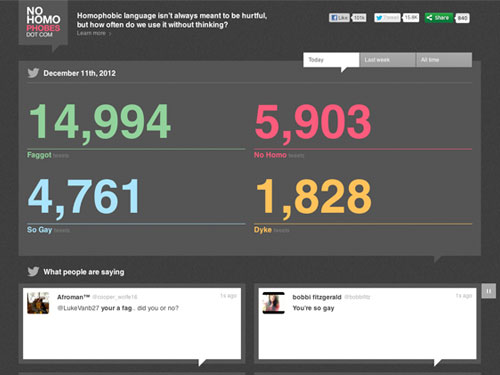
When Dr. Kristopher Wells was growing up he learned that the rhyme about "sticks and stones can break my bones, but names can never hurt me," is not true.
"Words do hurt. Words have the power to shape identities, realities, and in turn possibilities for our young people. All we need to do is pay attention to the increasing prevalence of cyber bullying. It used to be that if you could just run fast enough you could escape your bullies by running home and locking your bed room door. Now the bullies can follow youth via the Internet and social media right into that locked bedroom. There is no safe space left to escape the daily onslaught of bullying and the impact of casual slurs, prejudice, and discrimination."
Working with Institute for Sexual Minority Studies and Services, University of Alberta, Canada, Wells has created a website called http://www.NoHomophobes.com, which tracks the use of anti-gay language on Twitter, just one of several places where a youth may face online belittling language from their peers.
The site counts "tweets" that contain "faggot," "so gay," "no homo," and "dyke." The experiment began on July 5. From then to Nov. 14 there were:
1,505,891
No Homo tweets
1,435,585
So Gay tweets
4,128,674
Faggot tweets
563,912
Dyke tweets
Often with tens of thousands of tweets a day, the numbers were shocking to Dr. Wells. "In our initial planning, we expected a few hundred a day, not tens of thousands," Wells said. "We did not expect to see this kind of hurtful language used almost every second of every day!"
"We were also astounded at the frequency in which the word "faggot" is being used. That word has a painful history and is not used in very many positive contexts," Wells added. The hope is that http://www.nohomophobes.com will work like a mirror for society and that once people realize the pervasiveness of the language they will be conscious to change it."
He explained that the idea for the website came from looking at research over the past decade. "Studies done in the United States (GLSEN), Canada (Egale), and the UK (Stonewall) clearly demonstrate that lesbian, gay, bisexual, transgender and queer (LGBTQ) youth commonly hear phrases like "that's so gay" every day in their schools. In some cases, these comments come directly from the teachers themselves. It's often been said that homophobic language is the mostly commonly heard derogatory language heard in schools today, but the least responded to. The question is why?"
For Wells finding answers is personal. "My own experiences of silence and invisibility growing up as a gay youth and then becoming a closeted gay public school teacher serve as the foundation for me to advocate for change. We must believe in the possibility for a more inclusive, humane, and just society. If we don't do the work to build that society, who will?"
The website has now attracted over 400,000 unique visitors and has received international media attention from such diverse countries as Australia, Cambodia, India, Germany, UK, USA and Canada. The tracking does not place any value judgment on the tweets or the Twitter users, nor does it discern which ones may actually be supportive of LGBT people. It simply runs the tweets and tracks the number of times a trigger word or phrase is used.
"While not all people tweeting are homophobic, their use of derogatory language hurts, stereotypes, and further isolates sexual and gender minorities, their friends, and families. We believe that many people have simply become desensitized to these words and the devastating impact they have in our society. We are particularly concerned about the negative environment or climate these words have on youth who may be coming to terms with or questioning their sexual orientation or gender identity," Wells said. "By naming and calling attention to these words, we draw attention to their power to shape identities, foreclose possibilities, and further perpetuate violence and stereotypes."
The tally has no definite end date, and Wells is unsure what possibilities the research could bring about. For now he is just amazed at the numbers.
"It's striking to see the totals increase on a daily basis. I wonder what the totals will be after one year," he said. "Perhaps, what this website does best, and why it has received so much international attention, is how the site serves as a form of collective social conscience, which reminds us about the power of our words and how we have to take responsibility for our actions.
"We hope that people will see this website as an innovative way to interweave the use of social media and public education together to facilitate conversation on the impact of discrimination, prejudice, and hate. Ultimately, we hope that the website will engender conversation about the power of words and will encourage people to think critically before they speak or tweet! After all, words have the power to hurt, or to help.
"Perhaps, one youth who tweeted about the website summed it up the best when he said, "Now you know what my daily reality is like."
Besides http://www.nohomophobes.com, The Institute for Sexual Minority Studies and Services, University of Alberta is best known for their award-winning national youth leadership program, Camp fYrefly. Camp fYrefly is now in its 10th year and focuses on helping LGBTQ youth move from feeling at risk to becoming resilient leaders for social justice in their schools, families and communities. Learn more at http://www.ismss.ualberta.ca.










